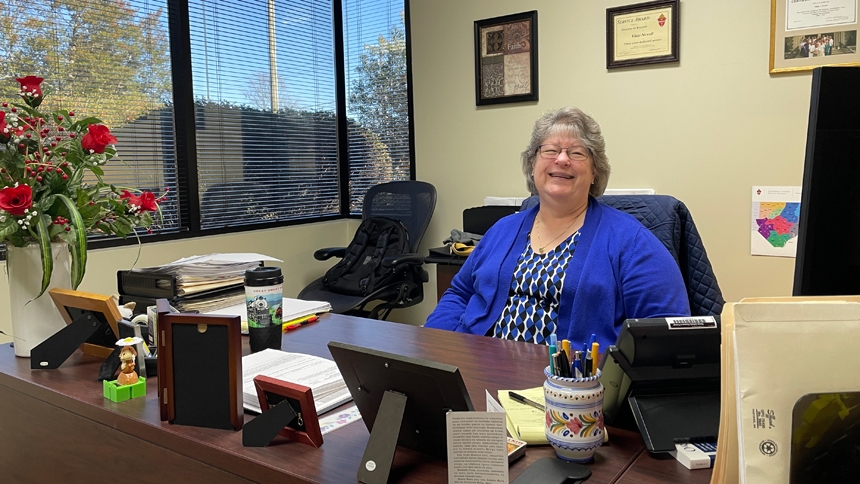
Vikki Newell kept a Christmas card in her desk drawer every day of the year, for years.
The card was from Bishop Joe Gossman, who led the Raleigh diocese from 1975 until 2006. The words he wrote have been important to Newell during her work as director of the Diocese of Raleigh’s Tribunal.
“It’s not glamorous,” he shared. “[It] is mostly unknown except to a few, but very important to those who need its services.”
Those services focused on declarations of nullity, which are documents stating that a marriage presumed to be valid according to Church law fell short of at least one of the essential, required elements.
“It’s 100 percent of what we do,” said Newell, noting that there are different types of cases and it’s not unusual for the Tribunal’s nine employees and 65 volunteers to see more than 250 a year. Formal cases can take eight to 11 months, while documentary cases are quicker.
“It’s a ministry,” she said. “Not everyone sees it that way but that’s what I believe.”
Newell, who retired from her full-time role in February, said Raleigh’s Tribunal has a pastoral nature. For her, that was fostered by Monsignor Jerry Sherba, former judicial vicar, and, before him, Sister Patricia Wilson, S.C. It was Sister Pat who first called Newell in 1992 to ask her about working for the Tribunal. From 1988 until that point, Newell had worked at a parish and as an assistant in different diocesan offices, including the chancery.
Sister Pat saw something special in Newell, who held an English degree from N.C. State University and once thought she may become a teacher.
“This work isn’t for everyone, but there’s something about this work that I like” said Newell, who has been married almost 37 years and went through the nullity process herself after a prior marriage. “I will never say [to a petitioner] that I know exactly how they feel, but I tell them I have an idea. You never know who is on the other end of that phone … you have to meet people where they are if you want to help them.”
People involved in the process are often facing big emotions following a civil divorce, she said. Some are angry; others wonder why they must go through it if they weren’t the one who left the marriage. Many are not Catholic, she said, and unfamiliar with the Church. Others are waiting for a declaration so they may marry in the Church. Newell has acclimated herself to hearing and talking about difficult, personal things.
For her, it’s been a gift to walk the path with people and help them move forward with their lives.
“You have to be understanding of people and learn how to say hard things in a gentle way,” she said. Newell added that she will always remember the trust and courage people seeking declarations showed by discussing their relationships and going through the process.
“It’s not our job to judge, even though we do have a judge,” said Newell in a tone that was as soft and understanding as it was matter of fact. “One thing I learned early on is that the Tribunal is the compassionate arm of the Church because it seeks to restore people to that for which they long.”

